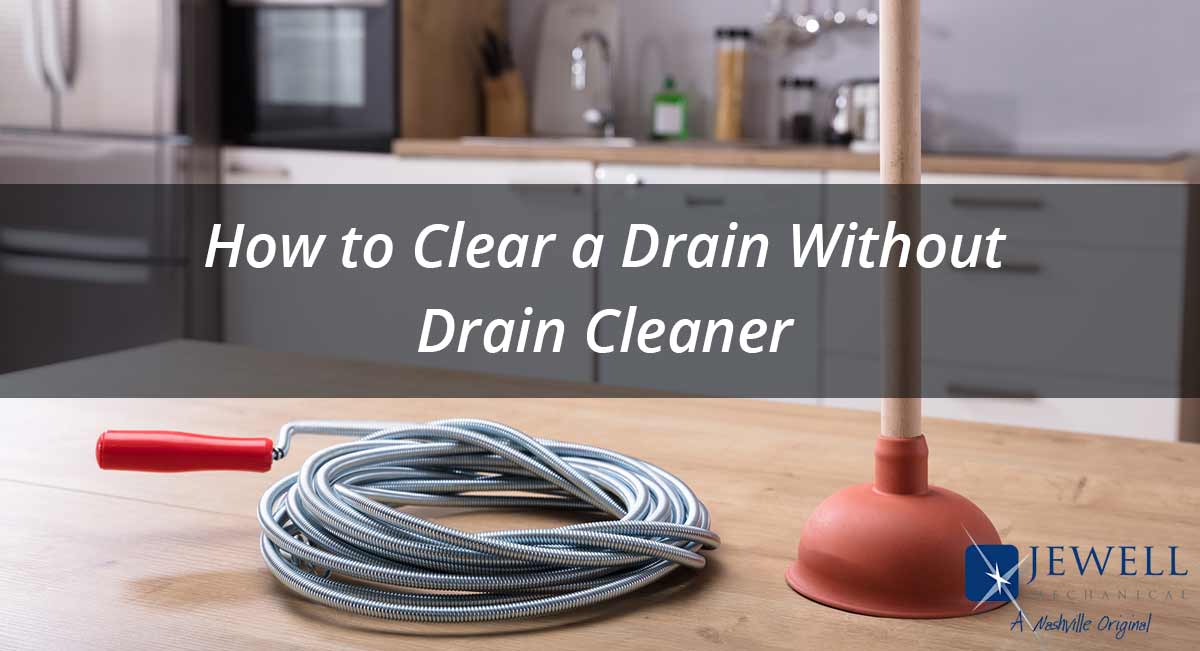
Finding a product on a hardware or supermarket shelf doesn’t make it safe to use. Have you ever read the warnings on a bottle of drain cleaner? Despite the benefits touted on the front side of almost any label, the back reveals that it’s one of the more dangerous chemicals in any home.
For one, drain cleaner can cause a chemical burn if even a small amount touches your skin. What if you’re careful, follow directions and wear protective gloves and goggles? That might protect your skin and eyes, but the expensive plumbing in your home is another story.
Know too that drain cleaner can damage metal pipes. While it doesn’t tend to cause chemical damage to PVC or CPVC pipes with occasional use, the heat reaction when drain cleaner mixes with cold water is immediate and powerful. (The extreme and sudden heat can soften or melt pipes). Then there’s the question of whether you really want to send a dangerous chemical into your community’s water system.
For its part, the Environmental Protection Agency promotes its Safer Choice program, which helps “consumers … identify products with safer chemical ingredients, without sacrificing quality or performance.” The availability of Safer Choice-labeled products reminds us that there are safer ways to clear a clog, and many are so effective you’ll never go back to dangerous chemicals.
Of course, there are other reliable tools that can also serve you well.
Difference Between Common Plungers and Toilet Plungers
Don’t disregard plungers just because they seem old-fashioned. They might be simple tools, but for some drain blockages, there’s nothing that’s easier or more effective to use. Every home needs at least two—a common (or cup) plunger and a toilet (or flange) plunger.
A common plunger has an inverted cup shape that fits over a drain opening and the rubber material flexes as you plunge.
Toilet plungers are similar, but have one important difference. In addition to the cup shape, they have a flange at the bottom that allows it to create suction on surfaces with curves, like those inside a toilet bowl.
Regardless of which type you use, there’s a trick to make plungers work better. Set the plunger evenly over the drain opening, then push down gently to force out the air. That makes the plunger seal around the drain.
Then, without breaking that seal, push and pull the plunger to dislodge the blockage. Unless the clog is very deep in the line, a plunger may be all you need.
Water Jet Drain Cleaner
For clogs that a plunger won’t dislodge, a water jet drain cleaner might do the trick. A water jet drain cleaner typically features a special nozzle mounted on the end of a heavy-duty hose.
After dropping the device into a plumbing cleanout or open drain you turn on the water. Water pressure builds up for a few seconds, and then it breaks free with a powerful jet. It’s effective for toilet paper clogs, but it’s also great for grease, soap and detergent buildup and many other blockages.
Keep in mind, though, that this isn’t the tool to drop into the kitchen sink or down the bathtub drain. The P trap underneath could send water back into your face. But if you can access the drain line past a cleanout, they’re easy to use and effective.
Plumber’s Auger or Snake
When nothing else will do, a plumber’s auger, sometimes called a snake, is the drain-clearing tool of choice. This mechanical device is usually a long, thin, metal coil that you push down into a drain to break through a clog and then pull back out again.
Some augers are manual and operate with a hand crank. These are the simplest for a DIY homeowner to handle, but they’re not as long as a professional model and they require a bit of physical strength.
Some use a power drill or another power source to twist and push the auger through the drain. Either way, they take practice to use. They can also be messy when you pull them back out of the drain—the kind of mess that may inspire you to leave the job to a professional.
Jewell Mechanical’s Drain Cleaning Service
Naturally your friendly neighborhood plumber at Jewell Mechanical knows the ins and outs of augers and every other drain-clearing tool. We can open a blocked drain fast and clean up the mess. There are no dangerous chemicals to buy and nothing to worry about.
If you live in or around the Nashville metropolitan area and need a reliable drain cleaning service, contact us online or give us a call at (615) 469-5965.
Useful Resources:
Drain Cleaning Service Nashville
